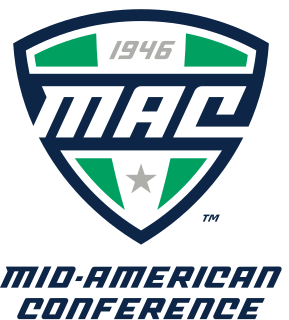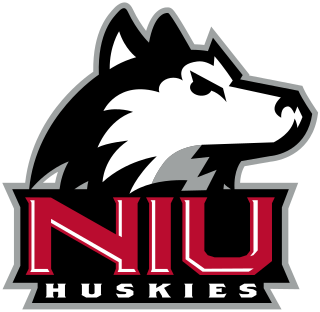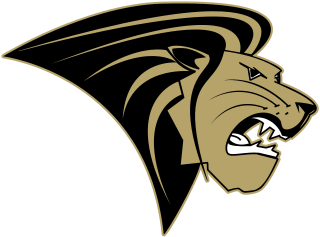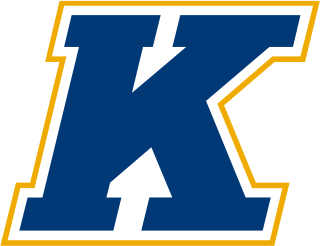Related Research Articles

The Mid-American Conference (MAC) is a National Collegiate Athletic Association (NCAA) Division I collegiate athletic conference with a membership base in the Great Lakes region that stretches from Western New York to Illinois. Nine of the twelve full member schools are in Ohio and Michigan, with single members located in Illinois, Indiana, and New York. For football, the MAC participates in the NCAA's Football Bowl Subdivision.

The Northern Sun Intercollegiate Conference (NSIC) is a college athletic conference affiliated with the National Collegiate Athletic Association (NCAA) at the Division II level, which operates in the western Midwestern United States. Nine of its members are in Minnesota, with three members in South Dakota, two members in North Dakota, and one member each in the states of Iowa and Nebraska. It was founded in 1932. With the recent NSIC expansion, the original six member schools have been reunited. With the inclusion of the several new member institutions, it is one of the largest Division II conferences in the country with 16 members.
The Women's College World Series (WCWS) is the final portion of the NCAA Division I softball tournament for college softball in the United States. Eight teams participate in the WCWS, which begins with a double-elimination tournament. In other words, a team is eliminated when it has lost two games. After six teams have been eliminated, the remaining two teams compete in a best-of-three series to determine the Division I WCWS National Champion.

The Association for Intercollegiate Athletics for Women (AIAW) was founded in 1971 to govern collegiate women's athletics in the United States and to administer national championships. It evolved out of the Commission on Intercollegiate Athletics for Women. The association was one of the biggest advancements for women's athletics on the collegiate level. Throughout the 1970s, the AIAW grew rapidly in membership and influence, in parallel with the national growth of women's sports following the enactment of Title IX. The AIAW functioned in the equivalent role for college women's programs that the National Collegiate Athletic Association (NCAA) had been doing for men's programs. Owing to its own success, the AIAW was in a vulnerable position that precipitated conflicts with the NCAA in the early 1980s. Following a one-year overlap in which both organizations staged women's championships, the AIAW discontinued operation, and most member schools continued their women's athletics programs under the governance of the NCAA.
The Association for Intercollegiate Athletics for Women was founded in 1971 to govern collegiate women’s athletics and to administer national championships. During its existence, the AIAW and its predecessor, the Division for Girls' and Women's Sports (DGWS), recognized via these championships the teams and individuals who excelled at the highest level of women's collegiate competition.

NCAA Division I (D-I) is the highest level of intercollegiate athletics sanctioned by the National Collegiate Athletic Association (NCAA) in the United States, which accepts players globally. D-I schools include the major collegiate athletic powers, with large budgets, more elaborate facilities and more athletic scholarships than Divisions II and III as well as many smaller schools committed to the highest level of intercollegiate competition.

College soccer is played by teams composed of soccer players who are enrolled in colleges and universities. While it is most widespread in the United States, it is also prominent in Japan, South Korea, Canada, and as well as in South Africa and the Philippines. The United Kingdom also has a university league. The institutions typically hire full-time professional coaches and staff, although the student athletes are mostly amateur and are not paid. College soccer in the United States is sponsored by the National Collegiate Athletic Association (NCAA), the sports regulatory body for major universities, and by the governing bodies for smaller universities and colleges. This sport is played on a rectangular field of the dimensions of about 70–75 yards sideline to sideline (width), and 115–120 yards goal line to goal line (length).

NCAA Division II (D-II) is an intermediate-level division of competition in the National Collegiate Athletic Association (NCAA). It offers an alternative to both the larger and better-funded Division I and to the scholarship-free environment offered in Division III.

The Temple Owls are the athletic teams that represent Temple University in Philadelphia, Pennsylvania. The current athletic director is Arthur Johnson.

The Memorial Athletic and Convocation Center, often referred to as the MAC Center and the MACC, is a multi-purpose arena on the campus of Kent State University in Kent, Ohio, United States. The building is primarily used as an athletic venue that is home to five Kent State Golden Flashes varsity athletic teams, including the men's basketball and women's basketball teams. The arena also hosts women's volleyball, women's gymnastics, and wrestling as well as commencement exercises, speakers, and concerts throughout the year. The building houses the offices of the Kent State Athletic Department and the coaches of each of the university's varsity athletic teams.

The Kent State Golden Flashes are the athletic teams that represent Kent State University. The university fields 19 varsity athletic teams in the National Collegiate Athletic Association (NCAA) at the Division I level with football competing in the Football Bowl Subdivision. Kent State is a full member of the Mid-American Conference (MAC) and has been part of the MAC East division since it was created in 1998. Official school colors are Kent State Blue and Kent State Gold.

The Eastern Michigan Eagles, formerly known as the Normalites and the Hurons, are the athletic teams for Eastern Michigan University in Ypsilanti, Michigan, United States. The Eagles compete in the National Collegiate Athletic Association (NCAA) at the Division I level as members of the Mid-American Conference (MAC). The only exception is the women's rowing program, which is a member of the Colonial Athletic Association. Altogether, the Eagles have won three NCAA Division II national championships and 13 NAIA Division I national championships in five different sports ; moreover, EMU has been NCAA Division I national runner-up twice. In 1940, the men's cross country team finished second to Indiana University at the national meet hosted by Michigan State University.

The Navy Midshipmen are the athletic teams that represent the United States Naval Academy. The academy sponsors 33 varsity sports teams and 12 club sport teams. Both men's and women's teams are called Navy Midshipmen or "Mids". They participate in the NCAA's Division I, as a non-football member of the Patriot League, a football-only member of the American Athletic Conference in the Football Bowl Subdivision (FBS), and a member of the Collegiate Sprint Football League (men), Eastern Association of Rowing Colleges (men), Eastern Association of Women's Rowing Colleges, Eastern Intercollegiate Gymnastics League (men), Mid-Atlantic Squash Conference (men) and Eastern Intercollegiate Wrestling Association. Navy is also one of approximately 300 members of the Eastern College Athletic Conference (ECAC).

College lacrosse is played by student-athletes at colleges and universities in the United States and Canada. In both countries, men's field lacrosse and women's lacrosse are played at both the varsity and club levels. College lacrosse in Canada is sponsored by the Canadian University Field Lacrosse Association (CUFLA) and Maritime University Field Lacrosse League (MUFLL), while in the United States, varsity men's and women's lacrosse is governed by the National Collegiate Athletic Association (NCAA), National Junior College Athletic Association (NJCAA) and National Association of Intercollegiate Athletics (NAIA). There are also university lacrosse programs in the United Kingdom sponsored by British Universities and Colleges Sport (BUCS) and programs in Japan.

The Northern Illinois Huskies are the athletic teams that represent Northern Illinois University (NIU). The Huskies are a member of the National Collegiate Athletic Association (NCAA) Division I and the Mid-American Conference (MAC). The athletic program is made up of seven men's sports and 10 women's sports. The football team competes in the Football Bowl Subdivision (FBS).

The Lindenwood Lions and Lady Lions are the intercollegiate athletic teams that represent Lindenwood University, located in St. Charles, Missouri, in intercollegiate sports as a member of the NCAA Division I ranks, primarily competing in the Ohio Valley Conference for most of its sports since the 2022–23 academic year.

The Kent State Golden Flashes men's golf team is an intercollegiate sport at Kent State University in Kent, Ohio, United States. The program was established in 1934 and competes in the National Collegiate Athletic Association at the Division I level as a member of the Mid-American Conference. Through the 2021–22 season, the Flashes have won 30 conference titles, which includes two championships won as a member of the Ohio Athletic Conference prior to 1951. The 28 MAC titles are the most men's golf titles in conference history and the most conference titles among any sport at Kent State. In addition to their conference titles, Kent State has made 37 appearances in the NCAA Division I Men's Golf Championships, winning three regional championships and advancing to the championship rounds 24 times. The program's highest national finishes are a tie for 5th in 2012, 6th in 2008, and 9th in 2000. Through 2022, Kent State has produced 27 MAC medalists.

The Kent State Golden Flashes softball team is an intercollegiate athletic team at Kent State University in Kent, Ohio, United States. The Flashes play in the National Collegiate Athletic Association (NCAA) at the Division I level as a member of the Mid-American Conference (MAC) East Division. The head coach since the 2016 season is Eric Oakley. Home games are played at the Judith K. Devine Diamond, a 500-seat facility that opened in 1999. The Flashes also have an indoor practice facility, the David and Peggy Edmonds Baseball and Softball Training Facility, which opened in 2014.
The Mid-American Conference women's golf championships is the conference championship tournament for women's golf in the Mid-American Conference, a Division I member of the National Collegiate Athletic Association (NCAA). All ten conference members qualify for the championship meet, which is held in three rounds. The winner of the championship receives a regional berth to the NCAA Division I Women's Golf Championships. The tournament began in 1999 and is rotated to different courses each year, with the various conference members acting as host. Through the 2022 championship, Kent State has won all 23 titles, a conference record for consecutive championships in any sport.
References
- ↑ "Gymnasts Elect Officers". The Kent Stater. Vol. XLIV, no. 73. March 6, 1959. p. 3. Retrieved May 22, 2017.
- 1 2 3 4 2016 MAC Gymnastics Record Book (PDF). Mid-American Conference. June 14, 2016. pp. 1–6. Retrieved March 27, 2017.
- ↑ Roose, Gretchen (March 19, 1981). "Lady gymnasts host conference tourney". Daily Kent Stater. Vol. LIV, no. 87. p. 16. Retrieved May 22, 2017.
- ↑ "Central Michigan Claims 2022 MAC Gymnastics Championship". Mid-American Conference. Retrieved August 30, 2022.